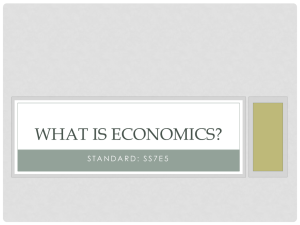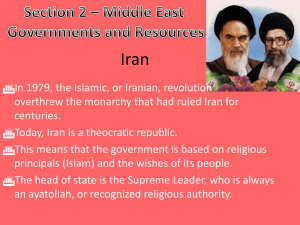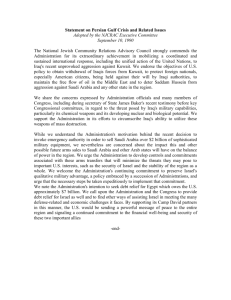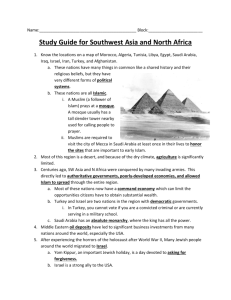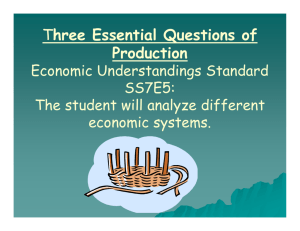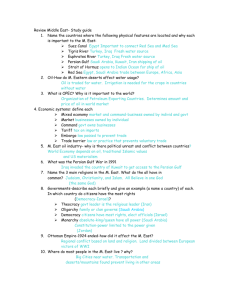Name: Date: Period: _____ Government/Civic Understandings
advertisement
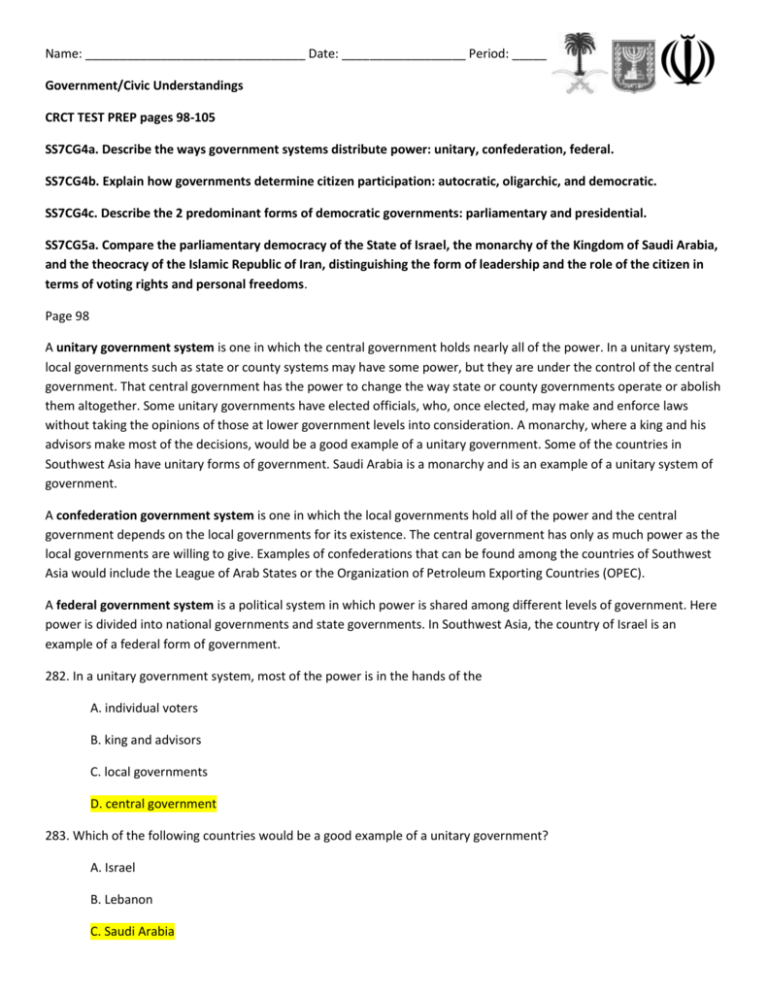
Name: ________________________________ Date: __________________ Period: _____ Government/Civic Understandings CRCT TEST PREP pages 98-105 SS7CG4a. Describe the ways government systems distribute power: unitary, confederation, federal. SS7CG4b. Explain how governments determine citizen participation: autocratic, oligarchic, and democratic. SS7CG4c. Describe the 2 predominant forms of democratic governments: parliamentary and presidential. SS7CG5a. Compare the parliamentary democracy of the State of Israel, the monarchy of the Kingdom of Saudi Arabia, and the theocracy of the Islamic Republic of Iran, distinguishing the form of leadership and the role of the citizen in terms of voting rights and personal freedoms. Page 98 A unitary government system is one in which the central government holds nearly all of the power. In a unitary system, local governments such as state or county systems may have some power, but they are under the control of the central government. That central government has the power to change the way state or county governments operate or abolish them altogether. Some unitary governments have elected officials, who, once elected, may make and enforce laws without taking the opinions of those at lower government levels into consideration. A monarchy, where a king and his advisors make most of the decisions, would be a good example of a unitary government. Some of the countries in Southwest Asia have unitary forms of government. Saudi Arabia is a monarchy and is an example of a unitary system of government. A confederation government system is one in which the local governments hold all of the power and the central government depends on the local governments for its existence. The central government has only as much power as the local governments are willing to give. Examples of confederations that can be found among the countries of Southwest Asia would include the League of Arab States or the Organization of Petroleum Exporting Countries (OPEC). A federal government system is a political system in which power is shared among different levels of government. Here power is divided into national governments and state governments. In Southwest Asia, the country of Israel is an example of a federal form of government. 282. In a unitary government system, most of the power is in the hands of the A. individual voters B. king and advisors C. local governments D. central government 283. Which of the following countries would be a good example of a unitary government? A. Israel B. Lebanon C. Saudi Arabia D. the United States 284. In a confederation government system, most of the power is in the hands of the A. legislature B. Individual voters C. Local governments D. Central government 285. What is a weakness of a confederation government system? A. A confederation is very expensive. B. Confederations are too large to rule effectively. C. A confederation does not share power with its members. D. The central government has only as much power as the local governments are willing to give. 286. Which Southwest Asian country would be a good example of a federal system of government? A. Iran B. Israel C. Kuwait D. Saudi Arabia Page 99 People who live under different kinds of governments often find there are great differences in the rights given to individual citizens. An autocratic government is one in which the ruler has absolute power to do whatever he wishes and makes and enforces whatever laws he chooses. Individuals who live under autocratic governments do not have any rights to choose leaders or vote on which laws are made and put into practice. Some autocratic governments allow the people rights in certain areas like managing local affairs, but the central government keeps control of all the most important aspects of the country’s life. In an autocratic system, people usually have little or no power to use against the government if they disagree with decisions that government or ruler has made. There are many different kinds of autocratic governments. A monarchy such as Saudi Arabia, where the king has ultimate power, is one example. An oligarchy means “government by the few”. In this form of government, a political party or other small group takes over a government and makes all of the major decisions. The people of the country have little choice but to go along with the decisions they make. This sort of government can be very similar to an autocratic government. There are several countries in Southwest Asia that might be described as oligarchies. In Syria, the ruling political party, the Ba’ath Party, controls much of the government. Syria has a nationally elected assembly, but most of the major decisions are made by the delegates of the Ba’ath Party and then handed down to the people. Iran could also be described as an oligarchy, because a small group of religious and political leaders makes many of the important decisions. In a democratic government system, the people play a much greater role in deciding who the rulers are and what decisions are made. “Democracy” comes from the Greek word “demos”, which means “people”. In this form of government, a great deal of power is left in the hands of the people. People who live in a democratic society generally recognize that there must be some rules to organize society, but the goal is to leave as much individual freedom as possible. Decisions are often made by majority votes, but there are also laws in place to protect individual rights. If a person living in a democracy feels his rights have been violated, he has the power to ask the government for help in correcting the situation. Among the countries of Southwest Asia, Israel is a good example of a democracy. Those organizing the new government of Iraq are hoping to establish a democratic system in that country as well. 287. Who makes most of the important governmental decisions in an autocracy? A. the ruler B. the people C. the court system D. the elected legislature 288. Which Southwest Asian country could be described as an autocracy? A. Iraq B. Israel C. Turkey D. Saudi Arabia 289. Who makes most of the important governmental decisions in an oligarchy? A. the king B. the people C. the legislature D. a small group of powerful leaders 290. Why do the individual voters have more power in a democracy than they do in an autocracy or an oligarchy? A. kings are always cruel rulers. B. The voters get to choose the people who make the laws. C. All of the power stays in the hands of the local governments. D. Voters in democratic countries always choose qualified leaders. 291. Which Southwest Asian country has a democratic form of government? A. Iran B. Israel C. Kuwait D. Saudi Arabia Use the information in the passage to answer the next 2 questions. The Saudi royal family controls the national government of Saudi Arabia. The king is the son of the previous king, and his son will rule after him. All government leaders serve by appointment from the king. The king appoints the governors of the provinces, as well. The king has the ability to remove any government official from a village, town, or province. The governments of the provinces and towns have no rights or authority. 292. If the Saudi royal family controls the government of Saudi Arabia, and the king is the ruler, what type of government is this? A. unitary B. federation C. confederation D. parliamentary 293. If the Saudi royal family controls the government of Saudi Arabia, and the king is the ruler, which best describes Saudi Arabia’s government? A. democracy B. dictatorship C. monarchy D. oligarchy Page 101 In a parliamentary form of democratic government, the people vote for those who represent the political party they feel best represents their views of how the government should operate. The legislature they elect, the Parliament, makes and carries out (enforces) the laws for the country. The party that wins the majority of representatives in the legislature usually chooses the leader of a parliamentary form of government. This leader is often called a Prime Minister or Premier and is recognized as the head of government. The Prime Minister leads the executive branch of the government and must answer directly to the legislature for the actions and policies recommended. In many parliamentary governments there is also a “Head of State” who is more of a ceremonial leader. The country of Jordan in Southwest Asia is a constitutional monarchy. The King serves as Chief of State and he has a Prime Minister who is appointed to consult with the monarchy. A Prime Minister holds power for whatever term of office the country’s constitution allows. A Prime Minister may be voted out of office before the term runs out if the party he leads begins to lose power. In that case, new elections may be called before his term of office is over. The Prime Minister of Jordan holds his job at the wishes of the king. In Israel, the citizens elect delegates to the national parliament, called the Knesset. The political party that gets the most seats when elections are held for the national assembly chooses the Prime Minister of Israel. Prime Ministers are chosen in different ways in different countries. A presidential form of democratic government is also called a congressional form of government. Here a President, or chief executive, is chosen separately from the legislature. The legislature passes the laws, and it is the duty of the president to see that the laws are enforced. The president holds power separately from the legislature, but he does not have the power to dismiss the legislature or force them to make particular laws. The president is the official head of the government. The legislature does not have the power to dismiss the president, except in extreme cases when the impeachment process can be used. The president is both the Head of State and the head of the government. The president is given specific powers and does not serve only in a ceremonial way. One difference between a presidential and parliamentary system of government is that a prime minister is a member of a parliament while a president is in a separate branch of the government. However, in a presidential system, the president serves for a set period of time. Unlike a parliamentary system, new elections are not held earlier if the ruling party begins to lose popularity. 294. Which branch of government is responsible for making and carrying out the laws in a parliamentary system of government? A. executive B. judicial C. legislative D. the monarch 295. The leader of a parliamentary system is often called the A. king B. president. C. governor. D. prime minister. 296. The leader of a parliamentary system is chosen by? A. the king B. a popular vote of the people C. a decision of the national courts D. the political party with the most representatives in the legislature 297. The Head of State in a parliamentary system is often a person who has A. no actual power. B. a veto for laws passed by the legislature. C. the most power in the national government. D. a ceremonial role without much actual power. 298. In a presidential system of government, how is a president chosen? A. by a decision of the national courts B. by a majority vote of the legislature C. in a separate vote from the one that chooses the legislature D. by the political party with the most representatives in the legislature 299. What is the role of the president regarding the laws passed by the legislature? A. The president must enforce those laws. B. The president can change the laws he doesn’t like. C. The president sends the laws to the states for approval. D. Laws passed by the legislature do not have to go to the president for approval. Page 103 Israel Israel is a parliamentary democracy. It has a government in which the people elect representatives from a group of different political parties. The head of the government is usually the leader of the political party with the majority of elected delegates. These people make the laws for the nation. The Israeli parliament is called the Knesset and its leader is called the Prime Minister. There are several main parties in the Knesset, but there are also many smaller parties represented. All Israeli citizens over the age of 18 are allowed to vote for members of the Knesset, and they vote for a candidate running for whichever political party they feel best represents the way they want the government to be. While most of Israel’s Jewish citizens see themselves as secular, meaning they do not feel the country’s laws should be based solely on religious beliefs, many Israeli laws are influenced by the Orthodox Jews, those who want government policy to be made according to religious law. These people represent about 25 percent of the Israeli population. Elections are held in Israel every four years, unless the party in power begins to lose the support of a majority of the Knesset members. In that case, elections for a new Knesset may be held earlier than scheduled. Saudi Arabia Saudi Arabia is ruled by a hereditary monarchy, which means the government is led by a king who comes from a family that has ruled the country for several generations. The king of Saudi Arabia has been a member of the al-Saud family since the 1920s. The king and his advisors, many of whom are his family members or influential business and religious leaders in the country, make the laws. There is no written constitution, and the king rules for life. The people of Saudi Arabia do not choose the king. When a king dies, the Saudi family announces who the next king will be from among their male family members. Conservative religious leaders also have a great deal of influence in decisions made by the monarchy. Much of Saudi law is based on what these religious leaders say is law found in the Quran, the Muslim holy book. Laws based on the teaching of the Quran are known as Shariah law. Nearly all Saudi citizens are Muslims. Iran A theocracy is a government in which God is seen as the true leader of the government and the country’s religious leaders serve as the political leaders. Iran is interesting, because even though the country does have a popularly elected president and legislature, religious leaders also play an important role in the government’s leadership. Some classify Iran as a theocratic republic. Iranian citizens over the age of 16 are eligible to vote in all elections. Most Iranians are members of the Shia group of Islam. The Shia generally believe that their religious leaders should play an active role in making political decisions, so many Shia clerics, or religious leaders, are involved in Iranian politics. Many of these religious leaders take the title Ayatollah. This is a title given to Shia religious leaders who have been recognized for their great scholarship and understanding of religious law. Because Iran has so much oil wealth and is a leading member of OPEC (Organization of Petroleum Exporting Countries), the decisions made by the Iranian government have an impact on countries all around the world. 300. The Israeli parliament (legislature) is called the A. Senate B. Knesset C. Congress D. House of Representatives 301. What role do religious leaders play in the Israeli government? A. They have some influence in making laws. B. They are not allowed to run for political office. C. Religious leaders always control which candidates are elected. D. They are guaranteed a certain number of representatives in each election. 302. Who is allowed to vote in Israeli elections? A. all citizens 16 years of age or older B. all citizens 18 years of age or older C. only men who can prove they are Israeli citizens D. only those who were actually born in the State of Israel 303. How often are elections for the national government held in Israel? A. Elections are held every 6 years. B. Party members are elected for life. C. Religious leaders can require new elections whenever they like. D. Elections are held every 4 years unless the ruling party calls for them to be held sooner. 304. Saudi Arabia is ruled by a A. king. B. popularly elected president. C. representative government. D. group of leading religious leaders. 305. How long does a monarch rule? A. one elected term B. a term of 10 years C. as long as Parliament allows him to rule D. until he dies or chooses to give up power 306. What role do the people play in a government that is a monarchy like that of Saudi Arabia? A. They have the power to vote a ruler out of office. B. The people get to approve the laws made by the ruler. C. They are guaranteed certain rights by their written constitution. D. They have little influence, as the ruler makes most decisions. 307. What is Sharia law? A. laws made by the king alone B. laws based on Parliamentary democracy C. laws based on the teachings of the Qur’an D. laws calling for a separation of church and state 308. What is the definition of a “theocracy”? A. a government that sees God as the supreme ruler B. a government that allows people to choose the leaders C. a system in which religious law and civil law are separate D. a system in which only religious leaders are allowed to vote 309. Why is Iran sometimes called a theocratic republic? A. Iran’s religious leaders make all the laws for the country. B. Religious leaders decide which Iranian citizens can vote. C. The people of Iran have no say in choosing their government leaders. D. Iran’s government is led by both an elected parliament and powerful religious leaders. 310. What is an Ayatollah? A. a Christian priest B. a Shi’a religious leader C. The title of a local governor D. a leader of a Jewish congregation
